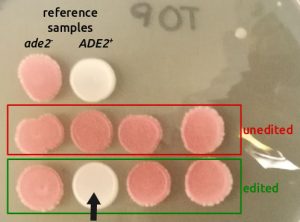Teaching modern methods is a cornerstone underpinning postgraduate education. Our taught MSc degrees feature a research skills module in which students undertake an extended mini-project, exposing them to the most up-to-date methodology in the biological sciences. Recently, our first students completed a newly designed practical on genome editing, a set of emerging techniques currently revolutionising medicine, biotechnology and life sciences research.
 With the support and guidance of Dr. Tobias von der Haar, our MSc students utilised approaches borrowed from a bacterial immune system (CRISPR) to engineer away a metabolic defect in a baker’s yeast strain. The deficiency, an inability to make an essential nutrient accompanied by red colony colour, is the yeast equivalent of inherited human metabolic disorders like Tay-Sachs and other diseases.
With the support and guidance of Dr. Tobias von der Haar, our MSc students utilised approaches borrowed from a bacterial immune system (CRISPR) to engineer away a metabolic defect in a baker’s yeast strain. The deficiency, an inability to make an essential nutrient accompanied by red colony colour, is the yeast equivalent of inherited human metabolic disorders like Tay-Sachs and other diseases.
The diverse applications of CRISPR have only emerged in the last five years but it is already having a profound influence on biological research. We are delighted that our postgraduate students have been able to benefit from this cutting-edge training, successfully generating functionally-modified yeast strains, while also exploring the ethics surrounding its use in biology.
The School of Biosciences offers MSc programmes in Biotechnology and Bioengineering, Cancer Biology, Drug Design, Infectious Diseases and Reproductive Medicine. For more information, see the School of Biosciences website.
